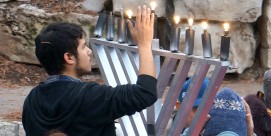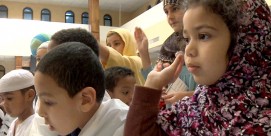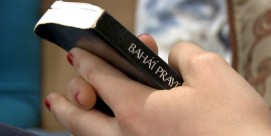In This Episode << SLIDE LEFT TO SEE ADDITIONAL SEGMENTS
Jewish High Holidays
BOB ABERNETHY, anchor: Next Wednesday evening the Jewish High Holidays begin with Rosh Hashanah, the Jewish New Year. According to Jewish tradition, this will be the 5765th year since Creation. We spoke about the High Holidays with a hazzan, also known as a cantor, who leads a congregation in sung prayer. He is Henrique Ozur Bass of Congregation Har Shalom in Potomac, Maryland. Also with his wife, a rabbi, Janet Ozur Bass, a Jewish day school teacher.
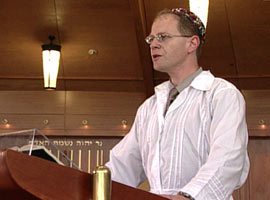
Hazzan HENRIQUE OZUR BASS (Congregation Har Shalom, Potomac, Maryland, praying in synagogue): Adonai, Adonai. As a hazzan in the congregation, I can ask for my congregation, for them to be inscribed in the Book of Life, for them to be granted another full year, and also carry their prayers all the way up to heaven.
Rabbi JANET OZUR BASS (Charles E. Smith Jewish Day School, Rockville, Maryland): Our relationship with God can only be whole and at one when we are at one with the people around us. So if I don’t ask for forgiveness, and in turn I don’t forgive, then I can’t have a healthy relationship with God. The shofar is a ram’s horn, and it is used as an announcing tool. it is used to wake us up. In the Bible it was used to call people for important announcements or for a war cry, and today it is used to remind us of our relationships during this time of year with God, with our community.
We are brought to the precipice of our death. We are reminded of our mortality. The liturgical poem asks who is going to die this year and asks with very, very specific and graphic language how that person is going to die. We are reminded of our mortality so that we can ask the question, so how should I live?
We are reminded with this very, very simple recipe for how to make our lives meaningful. “Teshuvah,” repentance; “tefillah,” and prayer; “tzedakah,” and giving of charity, but it’s also giving of ourselves to the community around us.
Hazzan OZUR BASS: It is such a powerful experience to let go of the guilt, the frustration, sometimes the anger that you have towards a specific incident that is just crowding your memory.
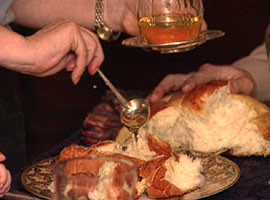 One common tradition is to eat apples and honey for a sweet New Year. A pomegranate has been incorporated because a pomegranate has many seeds, and it is a symbol of fertility, so we should be a fertile people. We have a round challah symbolizing that that there is no beginning to our lives. The year might start at Rosh Hashanah, but really it’s cyclical.
One common tradition is to eat apples and honey for a sweet New Year. A pomegranate has been incorporated because a pomegranate has many seeds, and it is a symbol of fertility, so we should be a fertile people. We have a round challah symbolizing that that there is no beginning to our lives. The year might start at Rosh Hashanah, but really it’s cyclical.
Rabbi OZUR BASS: In the Torah Yom Kippur is, we are told it is a day where we are to afflict ourselves. We are to refrain from exercising our appetites, not just eating but our sexual appetites. Our sense of physical beauty is diminished so that we can have moments when we meditate on inner beauty, on the beauty of our relationship with God. That’s what I love about these holidays. I am reminded to make the most of my relationships with the people around me, to treat myself with respect, to be the best that I can be as a human being, and when I fail I can have a second chance.

